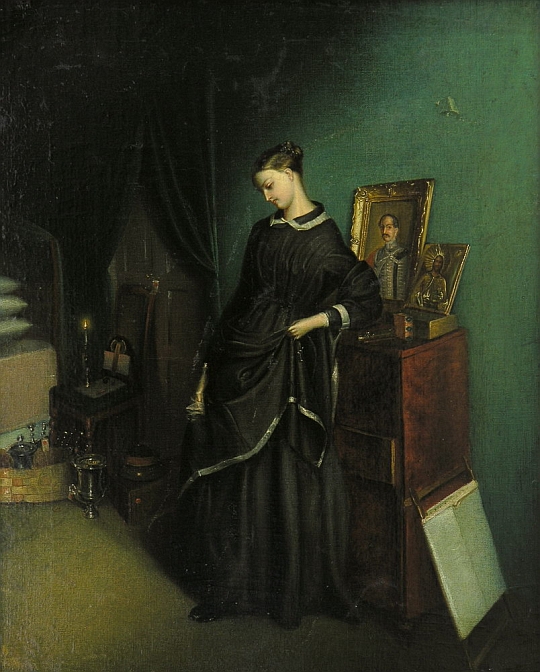
????? ??? ????????? ???????? ?????? ????
? ?? ????? ?????? ?????
?????????????? ??????? ???? ????,
? ???, ??????? ?????? ???????,
? ?? ????? ??? ???? ???????? ? ??????
???? ???????????? ??????:
? ??????????? ?????? ????? ????? ?? ???
???? ????????? ?????????;
????? ?????; ? ???, ??????????? ??????,
???????? ?????? ??? ???????;
???????????? ????????? ????? ????
???? ??????? ????????? ??????:
?, ? ??????????? ????? ????? ???,
? ???????, ? ?????????,
? ?????? ???????, ? ?????? ????? ???,-
?? ????? ????????? ?? ??????.
When the noisy day of mortal men grows still
With illusory nocturnal shadows.
And sleep, the harvest of a day’s exertion,
Sinks down upon the silent city streets
This is my hour of the night, when silent hours
Drag by in painful attentiveness:
During the indolent night the wound of my heart’s serpent
Rises up in me more powerfully;
Imagination surges: my mind, numbed by yearning,
Entertains a parade of tortured thoughts;
Before my eyes, quiet remembrance
Unfurls its lengthy parchment;
Thus set back, I rehearse the course of my life,
I quake and I curse,
I shed bitter tears and complain painfully,
But alas the dismal lines cannot be purged.
—Aleksandr Sergeevich Pushkin, Remembrance (????????????) (1827)(S.H. transl.)
So much of the Russian literary tradition has a bittersweet note to it, a sense of loss. And much of this tradition is also marked by a true and very profound patriotism, a pride of the achievements of Russia, but also a melancholy sense. Writers are concerned about the cloud which overshadows their land, preventing its people from finding their way. In a sense this poem of Pushkin’s sends that message, it dwells on the sense of loss, and it reminds us that past shapes present, that the sense of loss is a part of our present reality.
But what Westerner can really appreciate what it meant to be a Russian in the turmoil and cultivated climate of fear that hung over the country for much of the last century? For a cultured Russian, a person who understood the great and profound depths of a Pushkin or Lermontov, Dostoevsky or Tolstoy, Bunin or Bulgakov, what did it mean to see an overweening state, ruling by terror, crushing every spark of independent thought and creativity? The best and the brightest of several generations were destroyed by the totalitarian onslaught. Some survived, timidly testing the boundaries of their cage. There were great artists who portrayed this bleak horizon, Akhmatova, Mandelstam and Solzhenitsyn, for instance—but there is also Dmitri Shostakovich, who does so brilliantly in his chamber works.
Shostakovich is a master of the bittersweet remembrance of which Pushkin writes. The string quartet no. 8, for instance, or still more movingly the piano trio no. 2 from 1944: they paint in somber tones, filled with pain, but still they are marked by the unremitting press forward, into the future, with the aspiration for a new and better life. This is particularly the case with the “Jewish theme” that forms the bond between these two very great works, an element incorporated perhaps as a remembrance of the holocaust in particular, perhaps as a tribute to the millions of victims of the brutal totalitarianism that rocked and defined the twentieth century. Shostakovich gives us a dance of death, an evocation of the horrors of the totalitarian age, but he closes with a commitment to life and a determination to transcend. Listen to the powerful, sardonic fourth movement of the piano trio, opus 67, in this performance by a group of young soloists from the Music Academy of Ukraine. Do you hear the amazing evocation of klezmer tunes and sonority by the strings? A culture, a way of life, are fading from the scene, and Shostakovich grabs out to remember it. His reach is nurturing, protective. He seeks to preserve. Recollection becomes an act of faith.



